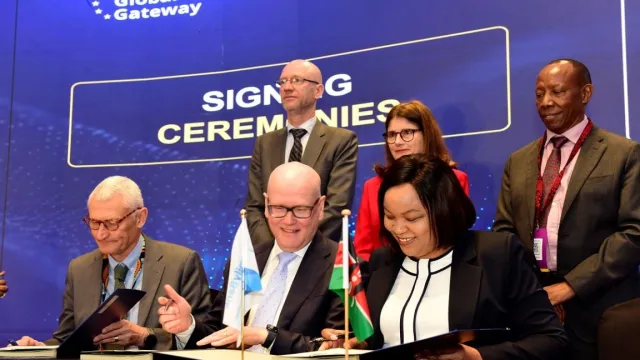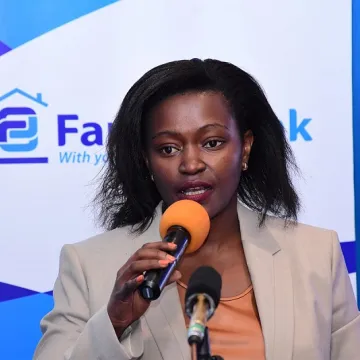EIB Global and Family Bank ready Sh14.7Bn credit for youth and women traders

Family Bank CEO Nancy Njau(R), European Investment Bank (EIB) Vice President Thomas Ostros (C) & Director for African International Partnerships at the European Commission Hans Christian Stausboll sign a partnership mobilising KES14.7 billion to expand credit access for women-owned/led enterprises and youth entrepreneurs with each institution contributing half of the total funding. Looking on is Head of the EIB Regional Hub for EA Edward Classen, EU Ambassador to Kenya H.E. Henriette Geiger and Family Bank Chair Lazarus Muema.
Lender Family Bank has announced a partnership with the European Investment Bank’s development arm (EIB Global) of up to KES14.7 billion (Euros 100 million) to enhance onward financing for youth and women-led investments in Kenya.
In an update on Monday, May 12, EIB Global said it will be offering Euros 50 million credit line to Family Bank, which will match the sum in an agreement to provide loans for Kenyan small and medium-sized enterprises (SMEs) and Mid-Caps.
The plan aims to bolster the working capital and investments of Kenyan SMEs and Mid-Caps within the trade and agriculture industries. The plan, which was unveiled during the second edition of the European Union-Kenya business forum in Nairobi, will see at least half of the financing go to businesses owned or run by women while a further minimum of 30 percent will be extended to youth entrepreneurs.
“SMEs represent over 80 percent of our customer base. As a result of our growth efforts, our market revenue from this segment continues to increase, further underscoring the sector’s strong growth potential,” said Family Bank Chief Executive Officer Nancy Njau.
“This partnership not only supports our 2025–2029 strategy to scale SME lending and deepen market segmentation but also enables us to better address the specific needs of SMEs across various value chains for sustainable growth and long-term value.”
Additionally, the initiative will see EIB Global offer Family Bank technical assistance to enhance its gender strategy and product offering to customers. This includes a potential certification under a 2018 initiative called 2X Challenge launched by development and multilateral finance institutions to invest in women worldwide.
“We recognise that beyond access to financing and investment opportunities, small businesses, especially those led by women, also need education, information and networking opportunities with like-minded enterprises,” said Njau. “This partnership enables us to offer that holistic support.”
The deal is part of the EU’s Global Gateway strategy to promote trade, manufacturing, agriculture, climate action and services, which are key priorities in Kenya.
It also feeds into a European initiative called Investing in Young Businesses in Africa (IYBA) that operates across Africa with the goal of creating sustainable jobs and expanding business opportunities. The EIB currently chairs the IYBA.
“The financing partnership we now have with Family Bank will inject much-needed capital into Kenya’s private sector to support businesses and create employment,” said EIB Vice-President Thomas Ostros. “Investing in women and youth entrepreneurs is not only the right thing to do but also the smart thing to do. It holds much promise to bring growth and prosperity to the Kenyan economy. This is a cause that is very important to us.”
“European Fund for Sustainable Development Fund Plus (#EFSD+) is a testament to our commitment to fostering sustainable economic growth by empowering small and medium-sized enterprises (SMEs) in partner countries,” said European Commission Director for International Partnerships – Africa, Hans Stausboll.
“Through this strategic partnership with the European Investment Bank, we're unlocking vital financial resources for SMEs in Kenya, via Family Bank. This collaboration not only fuels female-led entrepreneurship and innovation but also spurs climate smart and sustainable value chains across the Kenyan landscape. More in general, it contributes to Global Gateway strategy in Kenya across various economic sub-sectors including manufacturing, services, trade and competitiveness.”




